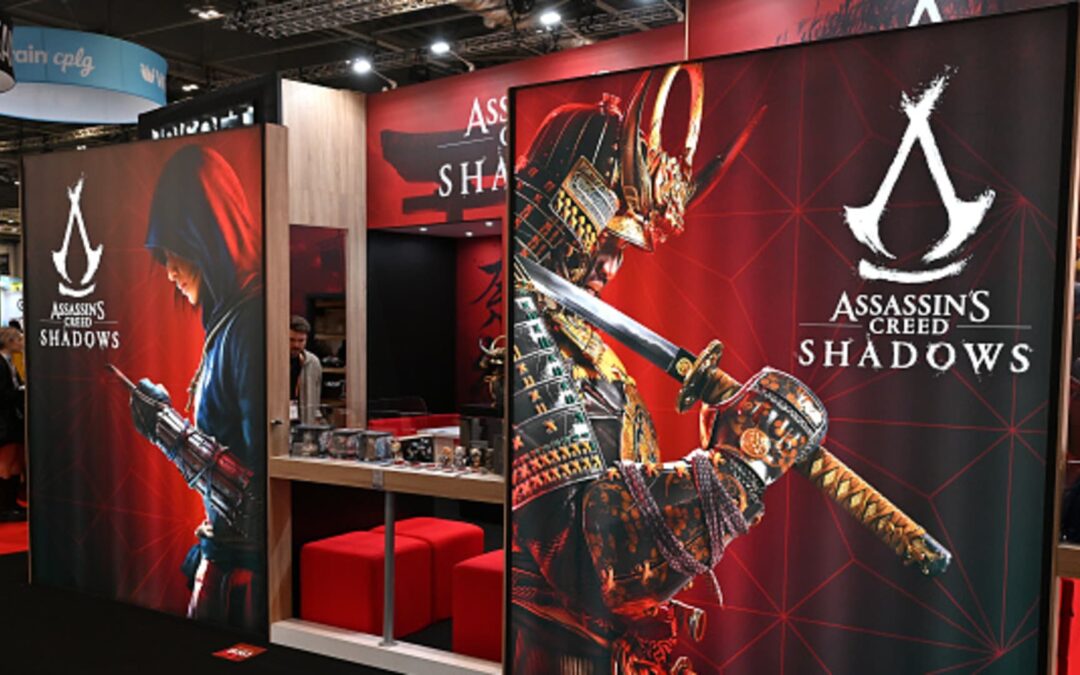Ubisoft postponed the release of the next title in its popular “Assassin’s Creed” game franchise — called “Assassin’s Creed Shadows” — by three months to Feb. 14, 2025.
John Keeble | Getty Images
French video game publisher Ubisoft is facing questions over its future, as it grapples with a lackluster games pipeline and pressure from investors to seek a sale.
The company, which produces the “Assassin’s Creed” franchise, said in updated guidance last week that it has postponed the release of the next title in the popular game series — called “Assassin’s Creed Shadows” — by three months to Feb. 14, 2025.
Ubisoft also cut its guidance for the 2024-2025 fiscal year, saying it now expects net bookings to fall to around 1.95 billion euros. Ubisoft said it expects net bookings for its fiscal second quarter to come in at 350 million to 370 million euros, down from 500 million euros anticipated previously.
“The revised targets are mainly a reflection of decisions taken for Assassin’s Creed Shadows and the softer than expected launch for Star Wars Outlaws,” Ubisoft said.
It comes after the company’s “Star Wars Outlaws” game — an action-adventure title based on the iconic sci-fi movie series, which was released this summer — was met with disappointing sales performance and a mixed reception from gamers. Ubisoft said that its learnings from the Star Wars Outlaws release pushed it to give more time to polish Assassin’s Creed Shadows.
The company said it was also scrapping plans to release its new Assassin’s Creed game with a “Season Pass,” which was a paid add-on providing access to a bonus quest and additional downloadable content at launch.
Ubisoft added that it now plans to release Assassin’s Creed Shadows on Valve Corporation’s online games store Steam on the day of its launch, ending its track record of exclusively distributing PC versions of its games on Epic Games’ digital storefront.
Yves Guillemot, CEO and co-founder of Ubisoft, speaks at the Ubisoft Forward livestream event in Los Angeles, California, on June 12, 2023.
Robyn Beck | AFP | Getty Images
“In the light of recent challenges, we acknowledge the need for greater efficiency while delighting players,” Ubisoft CEO Yves Guillemot said in the statement last week, adding that the company’s executive committee is launching a review to further improve its execution.
Ubisoft shares have slumped to decade-lows against this backdrop of dismal investor expectations about its triple-A games pipeline and financial prospects.
To further compound the business’ woes, the company is facing possible strike action in France after the country’s STJV video game workers’ union called for three days of industrial action on Oct. 15-17 over the company’s bid to get workers back in the office three days a week.
Pressure from activist investor
Following the decision to delay its upcoming Assassin’s Creed game, AJ Investments, an activist investor with a less than 1% stake in Ubisoft, said that it was working with other shareholders in the company to push the French firm to sell itself to private equity firms or to Chinese gaming giant Tencent.
Tencent owns a roughly 10% stake in Ubisoft.
In an open letter last week, AJ Investments said it had gathered the support of 10% of Ubisoft shareholders for its pressure campaign, adding that it intends to cooperate with proxy advisory firms in preparation for voting at the company’s next general meeting. CNBC could not independently verify this figure.
“We have talked to industry experts as potential boards members and executives to replace current management and realise our strategy targets, we will propose our candidates due time,” AJ Investments said.
AJ Investments noted it is due to speak with Ubisoft management on Tuesday to discuss its proposals. The firm added it would demonstrate in front of Ubisoft’s headquarters in Montreuil, Paris, if needed.
Several bank analysts slashed their price targets for Ubisoft after news of the delays to its upcoming game, although many kept their ratings unchanged.
Deutsche Bank, which downgrade the stock to “hold” from “buy,” said that Ubisoft’s guidance cut was “bigger than we expected” and that the postponement to Assassin’s Creed Shadows “pushes a substantial amount of revenue” out into the next fiscal year.
Deutsche Bank’s George Brown also said he anticipated Assassin’s Creed Shadows will perform worse than he expected initially, forecasting unit sales of 7 million in the 12-month period following release. That’s down from a projection of 8 million, previously.
Meanwhile, JPMorgan said in a note last week that they now expect lower unit sales of Ubisoft’s triple-A game releases and see a slower cadence of releases moving forward. JPMorgan maintained its “neutral” rating on Ubisoft stock, but cut its price target to 11 euros from 21 euros.
“Mid-size developers continue to be squeezed by development cost inflation which has not been matched by sufficient volume/ monetization improvement to sustain attractive returns,” JPMorgan analysts Daniel Kerven and David W Peat said in the note.
“UBI’s capital structure and lack of cash generation in recent years have left it under increasing pressure to cut investments/costs.”
Backlash
Still, some analysts were more sympathetic to Ubisoft’s struggles.
Analysts at Wedbush Securities suggested the firm had become the victim of coordinated “trolling” from people trying to force down user score averages for the company’s Star Wars Outlaws game on review sites.
“We believe Star Wars Outlaws was impacted by a coordinated effort that sought to troll Ubisoft games specifically and Star Wars content in general,” Wedbush analysts Michael Pachter, Alicia Reese and Kade Bar wrote in the note last week.
“The game received an unusual number of user reviews with a clear negative bias (including a large percentage of “zero” reviews), despite seeing acceptable review scores from reputable review sites. This is a case of a rare incel victory that led to Ubisoft having to take down its numbers,” they added.
Wedbush’s analysts said that, despite delays to its upcoming Assassin’s Creed title, they expect the game to sell 7 million units in its launch quarter and think it has “potential to be one of Ubisoft’s best sellers ever.”
Industry slump
Ubisoft’s woes comes as the broader video games space is facing an industry-wide slump.
The global games market is set to grow only 2.1% year-over-year in 2024, according to research firm Newzoo. That’s up from 0.5% growth in 2023, but no where near the surging growth levels witnessed during the 2020 and 2021 Covid-19 pandemic years.
James Lockyer, technology research analyst at U.K. investment bank Peel Hunt, said that part of the problem for game publishers today is that gamers are devoting more of their time to older games than to newer titles.
“In the years that followed Covid, the number of games released per year has grown substantially,” Lockyer told CNBC via email. “Consequently, consumers have had more choice over the last couple of years.”
“However, more choice plus a cost-of-living squeezed wallet has meant consumers’ cash has been spread more thinly, leading to revenues and ROIs [return on investment] of those games often coming out below expectations,” he added.








